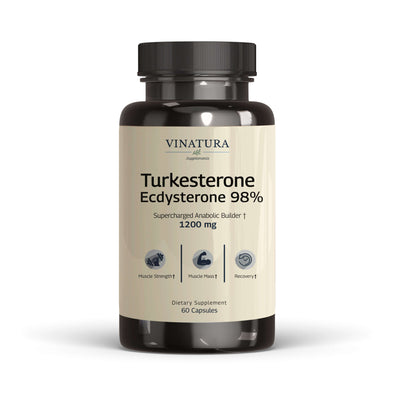
Can You Take Leucine And HMB Together?
Leucine and HMB are popular dietary supplements to enhance muscle growth and expedite recovery. A common query arises - Can Leucine and HMB be consumed concurrently? This document delves into this inquiry, exploring Leucine and HMB attributes, their respective advantages, and the potential benefits or considerations of combining these two supplements to address the question “Can you take Leucine and HMB together?”
Before exploring further, please read the disclaimer located at the end of this webpage.
What Is Leucine?
Leucine is an essential branched-chain amino acid (BCAA) with significant roles in muscle regulation.
- As stimulation of the mTOR signaling pathway, Leucine stimulates protein synthesis, which is essential for maintaining and growing muscle [7].
- Moreover, this BCAA protects against muscle atrophy by inhibiting certain factors in the PI3/AKT pathway, effectively counteracting muscle wasting [2, 5].
- Apart from its muscle-centric roles, Leucine also impacts our dietary habits. It modulates food intake by influencing the central nervous system, which helps maintain nutritional levels and prevent obesity [4].
You may also like: What Foods Are High In Leucine? 15 Natural HMB Sources

What Is HMB?
HMB, also called Beta-Hydroxy Beta-Methylbutyrate, is a metabolite from the essential amino acid leucine. Approximately 5% of dietary Leucine undergoes conversion to HMB within the body.
This endogenously synthesized metabolite is produced in the liver, contributing to a daily production of around 0.2 to 0.4 grams of HMB, depending on the leucine content in the diet. Renowned for its potential health benefits, HMB holds promise for overall well-being.
HMB is mainly known for inhibiting muscle protein breakdown, an effect brought about by the stimulation of the mTOR signaling pathway.
This mechanism supports HMB benefits for muscle growth and strength, making HMB a valuable supplement for individuals engaged in regular physical training [3, 6].
Furthermore, HMB reduces muscle breakdown by inhibiting the ubiquitin-proteasome system associated with muscle atrophy [1].
HMB also reduces inflammation and promotes muscle recovery after strenuous workouts or injuries [1].
When To Use HMB And When To Use Leucine?
The timing for using HMB is quite flexible as long as a daily dose of 3g is adhered to. You could consider supplementing with HMB:
- For optimal effectiveness, it's suggested to consume HMB before, during, and after exercise for at least 60 minutes.
- Before resting for the night.
- Alongside each meal throughout your day.
For Leucine, while there's no specific timing prescribed, taking a daily dose of 3g is typically recommended right after you conclude your workout - preferably within a 15-30 minute window for best results. This immediate post-workout supplementation assists in maximizing the benefits of Leucine.
Which Is Better, Leucine Or HMB?
Choosing between Leucine and HMB isn't necessarily a matter of which is better, but rather which is more suitable for your needs and circumstances.
Both Leucine and HMB offer unique benefits for muscle growth and recovery. Leucine is a powerful catalyst for stimulating muscle protein synthesis and can be instrumental in muscle growth and maintenance.
In contrast, while promoting muscle growth, HMB is particularly effective at inhibiting muscle protein breakdown and accelerating recovery post-exercise.
Cost-wise, Leucine is the more affordable choice, which may make it more appealing to some individuals. However, the choice depends on your fitness goals, dietary needs, and physical conditions.
Can You Take Leucine And HMB Together?

Combining HMB and Leucine is entirely feasible and can even provide enhanced benefits. HMB can be supplemented 60 minutes before your workout to initiate muscle protein synthesis and minimize protein breakdown.
On the other hand, Leucine can be consumed immediately after your exercise, preferably within a 15-30 minute window, to stimulate protein synthesis further.
Maintaining a daily dose of 3g for each supplement is essential to optimize their effects.
This combination approach leverages the unique advantages of both supplements, potentially leading to more significant muscle growth, reduced muscle breakdown, and quicker recovery.
You may also like: HMB And Vitamin D3 Benefits for Muscle Function And Fat Loss
Benefits Of HMB And Leucine Together On Overall Health
Benefits Of HMB And Leucine On Weight Management
Regarding weight management, both HMB and Leucine can contribute positively.
With its potential to act positively on the antioxidant system, HMB can aid in weight loss and combat obesity. This is particularly beneficial for individuals to achieve a healthier weight range and lifestyle.
On the other hand, Leucine's effect on the central nervous system can modify nutritional intake, thereby potentially limiting uncontrolled weight gain.
A controlled diet and consistent workout routines can be further enhanced with the supplementation of Leucine and HMB, supporting the journey toward effective weight management.
Benefits Of HMB And Leucine On Muscle Growth
The combined use of HMB and Leucine can yield remarkable results for muscle growth.
HMB plays a critical role in inhibiting muscle protein breakdown, a mechanism facilitated by the stimulation of the mTOR signaling pathway.
Similarly, Leucine, a potent stimulator of muscle protein synthesis, significantly contributes to muscle growth and maintenance.
These two supplements can optimally stimulate protein synthesis, inhibit protein breakdown, and promote faster muscle recovery after intense workouts.
Conclusion
Leucine and HMB offer distinct yet complementary benefits for health, weight management, and muscle growth. Their combined use can lead to enhanced muscle synthesis, reduced muscle breakdown, and improved recovery post-exercise. Meanwhile, their roles in supporting weight management underscore their broader implications for overall well-being. Hence, the answer to "Can you take Leucine and HMB together?" is Yes. Incorporating these supplements into your fitness and health routine while adhering to recommended dosages can be a strategic step toward attaining your goals.
Read more:
- What Are the Benefits of HMB for Bodybuilding?
- 7 Best HMB and Vitamin D3 Supplements for Muscle Growth
- 13 Best HMB Supplements for Muscle Growth
References
- [1] Arazi, H., Taati, B., & Suzuki, K. (2021). HMB Supplementation and Resistance Training: Current Overview on Inflammation, Oxidative Stress and Cardiovascular Risk Factors. Recent Research Advances in Biology Vol. 5, 155–168. https://doi.org/10.9734/bpi/rrab/v5/7486d
- [2] Baptista, I. L., Silva, W. J., Artioli, G. G., Guilherme, J. P. L. F., Leal, M. L., Aoki, M. S., Miyabara, E. H., & Moriscot, A. S. (2013). Leucine and HMB Differentially Modulate Proteasome System in Skeletal Muscle under Different Sarcopenic Conditions. PLoS ONE, 8(10), e76752. https://doi.org/10.1371/journal.pone.0076752
- [3] DEBASIS , B., SREEJAYAN , N., & CHANDAN , K. S. (n.d.). NUTRITION AND ENHANCED SPORTS PERFORMANCE.
- [4] Martínez-Arnau, Fonfría-Vivas, & Cauli. (2019). Beneficial Effects of Leucine Supplementation on Criteria for Sarcopenia: A Systematic Review. Nutrients, 11(10), 2504. https://doi.org/10.3390/nu11102504
- [5] Pedroso, J., Zampieri, T., & Donato, J. (2015). Reviewing the Effects of l-Leucine Supplementation in the Regulation of Food Intake, Energy Balance, and Glucose Homeostasis. Nutrients, 7(5), 3914–3937. https://doi.org/10.3390/nu7053914
- [6] Prado, C. M., Orsso, C. E., Pereira, S. L., Atherton, P. J., & Deutz, N. E. P. (2022). Effects of β‐hydroxy β‐methylbutyrate (HMB) supplementation on muscle mass, function, and other outcomes in patients with cancer: a systematic review. Journal of Cachexia, Sarcopenia and Muscle, 13(3), 1623–1641. https://doi.org/10.1002/jcsm.12952
- [7] Wilkinson, D. J., Hossain, T., Hill, D. S., Phillips, B. E., Crossland, H., Williams, J., Loughna, P., Churchward‐Venne, T. A., Breen, L., Phillips, S. M., Etheridge, T., Rathmacher, J. A., Smith, K., Szewczyk, N. J., & Atherton, P. J. (2013). Effects of leucine and its metabolite β‐hydroxy‐β‐methylbutyrate on human skeletal muscle protein metabolism. The Journal of Physiology, 591(11), 2911–2923. https://doi.org/10.1113/jphysiol.2013.253203
Author

Product Disclaimer
Including an ingredient or study does not evaluate, endorse, or recommend any Vinatura product or any third-party product. Some ingredients discussed may not be used in any Vinatura product.
The content of the articles has not been evaluated by the Food and Drug Administration (FDA) and is not intended to promote or endorse any specific product. Any products sold on this website are not intended to diagnose, treat, cure, or prevent any disease.
Opinions and Endorsements
Any claims, statements, or opinions expressed in the articles are those of the author(s) and do not necessarily reflect the views or opinions of the manufacturers of the dietary supplement products. The products sold on this website are separate from the content of the articles and are not directly endorsed or associated with the information presented here.
Liability Disclaimer
The author(s) of the articles, website, and manufacturers of the dietary supplement products do not assume any liability for any potential consequences arising from the use of the information provided in the articles. Ingredient effects, dosages, and safety vary by individual, formulation, and context; some ingredients interact with medications or may be unsuitable during pregnancy or lactation. It is recommended that individuals consult with a qualified healthcare professional before making any dietary or lifestyle changes, including the use of dietary supplements.
Product Usage
Please refer to the product labels and packaging for specific usage instructions and guidelines for the dietary supplement products sold on this website.
Customer Support
For any concerns or questions regarding the dietary supplement products, please contact our customer support team, who will be more than happy to assist you.





Leave a Comment
Be the first to comment.
What do you think?